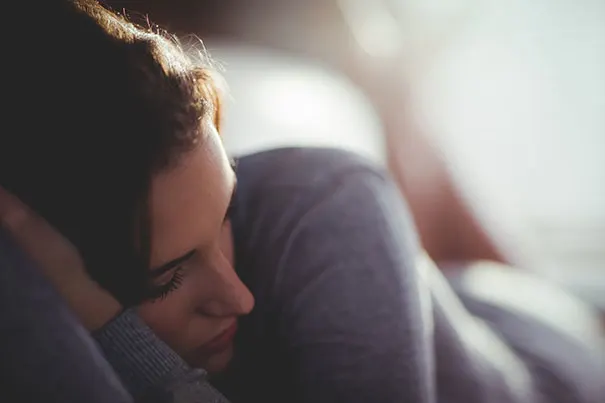What Are the Signs of Postpartum Depression?
You've just had a beautiful baby, and you had expected to be filled with joy during this time. Instead, you are overwhelmed by feelings of dread, self-doubt, sadness, and confusion. Feeling overwhelmed – particularly in those first few months – can be totally normal: You have a new family member, you're not sleeping much, and you have a lot on your plate. But if your feelings seem to be something else, something perhaps a little more severe, it may be that you have postpartum depression, or PPD, which is also known as postnatal depression. This condition is not a flaw or a sign of weakness — instead, it can be considered a complication of childbirth. Read on to find out what postpartum depression is, learn some of the signs and symptoms, and find some coping mechanisms that may help you manage your symptoms in conjunction with your doctor's plan.
What Is Postpartum Depression?
Postpartum depression is a medical condition that causes a new mum to feel severe and long-lasting negative emotions or thoughts in the months after giving birth. Some of the main signs and symptoms of PPD are listed below. Postpartum depression can occur after any delivery — not necessarily the first one. It usually starts between one to three weeks after the baby is born, but for some women, it may begin several months later, or even up to a year after giving birth.
How common is postpartum depression? It’s more common than you might think. About one in seven women who've given birth experience this condition. Around half of those later diagnosed with PPD may start to have symptoms during pregnancy. So if you do feel like you have the symptoms of PPD or you have been recently diagnosed, know that you are not alone, and in time you will start to feel better once more.
How long can postpartum depression last? Your personal situation and doctor's treatment plan will have a bearing on how soon it will come to an end. For some women, symptoms may peak after a few weeks, but then linger for 3 to 12 months more. Getting treatment early can help you better manage your symptoms, and may help resolve the condition sooner.
Postpartum depression should not be confused with the ‘baby blues'. This is when you have less severe symptoms of feeling sad and crying, or having anxiety and trouble sleeping. These milder symptoms typically begin a few days after you give birth, and usually go away after a couple of weeks. While having the baby blues can really get you feeling down, rest assured those feelings will soon pass. PPD should also not be confused with a rare mood disorder called postpartum psychosis, which involves more severe symptoms, such as hallucinations.
Postpartum Depression Signs and Symptoms
The first step is to recognize whether you may have PPD. The signs of postpartum depression include:
Depressed mood
Severe mood swings
Excessive crying
Difficulty bonding with your baby
Withdrawing from loved ones
Loss of appetite
Eating much more than usual
Inability to sleep (insomnia)
Sleeping too much
Overwhelming fatigue or loss of energy
Reduced interest and pleasure in activities you used to enjoy
Intense irritability and anger
Fear that you're not a good mother
Feelings of worthlessness, shame, guilt, or inadequacy
Diminished ability to focus
Decreased ability to handle everyday tasks
Severe anxiety and panic attacks
Thoughts of harming yourself or your baby
Recurrent thoughts of death or suicide.
Only after speaking to your healthcare provider will you be able to know the answer to the question: Do I have postpartum depression? But you may want to ask yourself (and then tell your doctor) whether you are experiencing any of the symptoms listed above, and whether:
Any of these symptoms has lasted longer than two weeks
Your symptoms are getting worse, not better
You're finding it hard to care for your baby
You're finding it challenging to complete everyday tasks.
Causes and Risk Factors
It's not known exactly what causes postpartum depression, but it is likely triggered by a combination of physical and emotional factors, which may include:
Hormonal changes.
A sharp drop in the pregnancy hormones estrogen and progesterone after you give birth to your baby may contribute by causing mood swings. In addition, levels of other hormones produced by your thyroid gland may also drop, making you feel tired, sluggish, and depressed.
Sleep deprivation.
Not only recovering from giving birth, but caring for a newborn takes its toll on a new mom's ability to get the rest she needs. This sleep deficit builds up and can lead to physical discomfort as well as exhaustion, which can trigger symptoms of postpartum depression.
Emotional issues.
This is a period of big change in a woman's life. Feeling overwhelmed and anxious, feeling less attractive, struggling with your sense of identity, and feeling like you've lost control of your life may also be contributing factors.
Risk factors for postpartum depression include if you have
a history of depression, either during pregnancy or at other times
had postpartum depression after a previous pregnancy
family members who've had depression or other mood problems
experienced major stressors during the past year (even those unrelated to pregnancy)
a baby who has health problems or other special needs
had difficulty breastfeeding
problems in your relationship with your husband
a weak support system
financial worries
bipolar disorder.
If you have had postpartum depression before, tell your doctor as soon as you find out you are pregnant. Your doctor may take any of the following steps:
Monitoring you closely for any signs and symptoms of depression
Giving you a depression-screening questionnaire during your pregnancy and after delivery
Suggesting you attend support groups, counselling, or other therapies to help you handle any mild depression
Recommending antidepressants — even during pregnancy
Recommending psychotherapy immediately after delivery.
How to Cope With Postpartum Depression
Know that there is postpartum depression help available through your doctor. Your doctor will talk with you about postpartum depression treatment options such as psychotherapy (also known as talk therapy or mental health counselling) and/or medications, like antidepressants.
While PPD isn't generally something you can treat on your own, these ideas may help set a solid foundation for your medical treatment plan, and could help speed recovery:
Maintain a healthy lifestyle. Add gentle exercise into your daily routine. For example, take a walk with your baby. Try to get adequate rest, and eat healthily.
Have realistic expectations. You're adjusting to having a new baby, so don't put pressure on yourself for everything to be perfect.
Make time for yourself. Organise someone to care for your baby, and have some me-time. Leave the house, and do something relaxing that you enjoy.
Connect with others. Feeling isolated can be a problem for some new mums. Talk to your loved ones about how you're feeling, and speak to other mums about their experiences.
Share the load. Your loved ones will often be happy to help out. Sometimes all it takes is just to ask! This time off will give you a chance to have some much-needed breathing room.
Keep going. Follow your doctor's advice, but don't stop treatment simply because you ‘feel better', as this may lead to a relapse.
How to Support a Loved One Who Has Postpartum Depression
People with PPD may not be able to tell that they're depressed; they may not know the signs and symptoms. If you suspect a loved one has postpartum depression, help her seek medical advice right away. Keep in mind that as a husband, friend, or family member, you can't ‘fix' postpartum depression, but you can be there for the new mum. Here are some practical things you can try:
Reassure her that she will get better
Listen to and accept her feelings; understand that she cannot control any negative feelings
Offer to take care of the baby so she has space to do relaxing things like go for a walk or get a massage, guilt-free
Arrange a family member, friend, or babysitter to care for the baby for a few hours, so she has a chance to sleep
Help out by doing any basic errands, chores, or day-to-day tasks to take some of the responsibility off her plate.
Create a family routine or ritual to make you feel more connected towards the family and the newest family member
If you are the other parent of the newborn, keep in mind that there is such a thing as paternal and male postpartum depression. If your wife is depressed, it can also affect you, as your risk of depression is already higher during this time. If you find yourself feeling depressed, try the above-mentioned tools, and speak to your doctor.
Postpartum depression is not your fault. Unfortunately, many women feel guilty or ashamed because they can't find any reason to explain why they feel so unhappy. Some may even experience having their feelings dismissed or criticised by others. Remember, this is a medical condition that requires treatment, and it's important not to suffer alone. There is support out there, and once the fog clears, you'll be able to enjoy this time with your baby.


